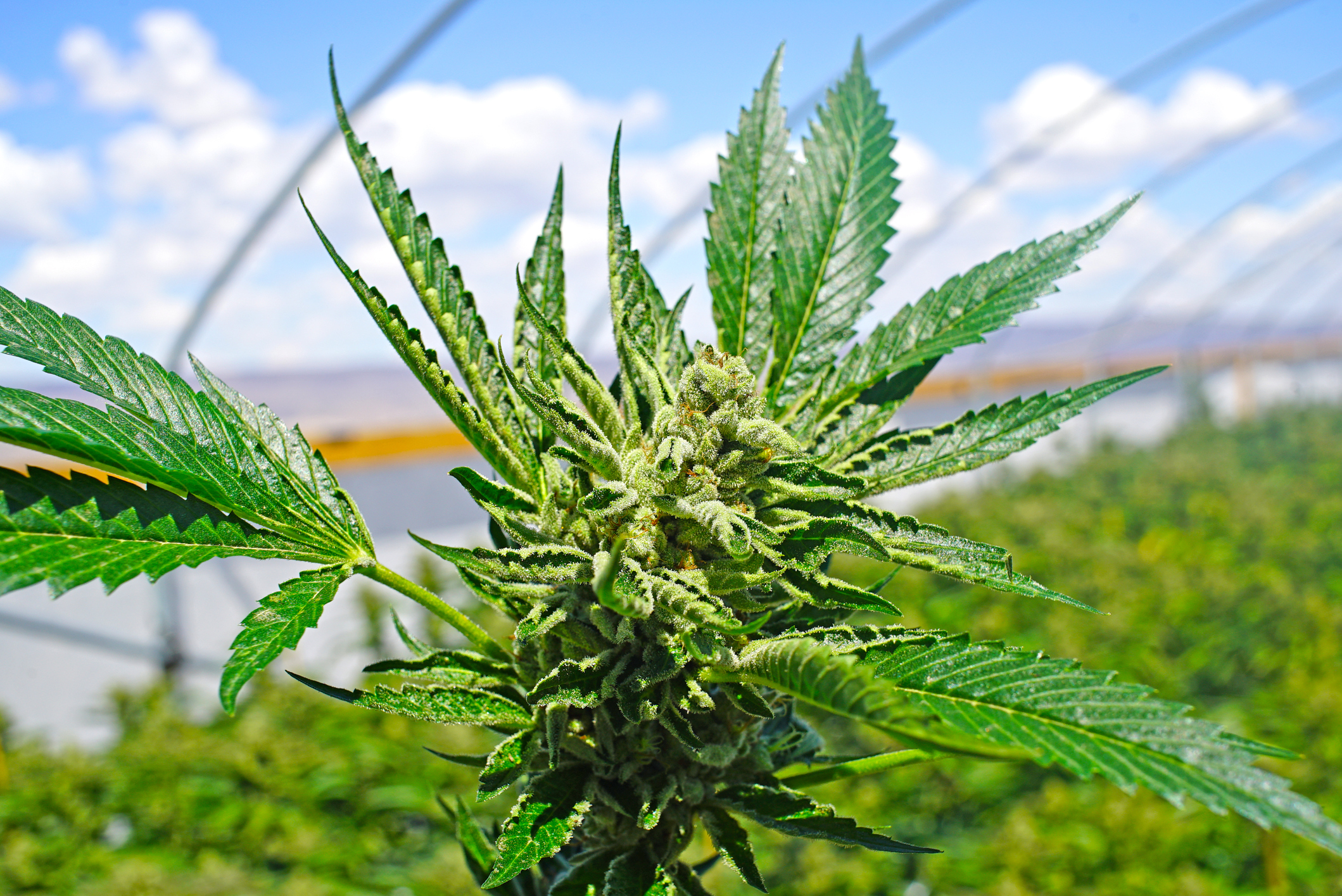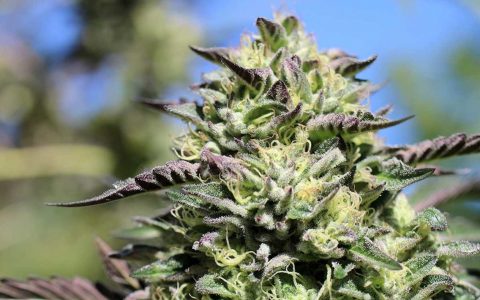 Cuttings are trimmed and cleaned up by hand at a workstation to create semi-uniformity, making production easier. Dark Heart’s 2019 strains include Vanilla Frosting, Magic Melon, Sherbert, Remedy CBD, Sour Diesel, Cookies, and, of course, Blue Dream. (David Downs/Leafly)
Cuttings are trimmed and cleaned up by hand at a workstation to create semi-uniformity, making production easier. Dark Heart’s 2019 strains include Vanilla Frosting, Magic Melon, Sherbert, Remedy CBD, Sour Diesel, Cookies, and, of course, Blue Dream. (David Downs/Leafly) Each cutting is trimmed for length and dipped in a hormone bath that promotes root growth. They are placed in the growing medium rockwool, which acts like soil, allowing the clones to root. (David Downs/Leafly)
Each cutting is trimmed for length and dipped in a hormone bath that promotes root growth. They are placed in the growing medium rockwool, which acts like soil, allowing the clones to root. (David Downs/Leafly)
 An assembly-line process includes rollers to send trays of prepped clones into a separate room where the clones will root in rockwool under LED light. (David Downs/Leafly)
An assembly-line process includes rollers to send trays of prepped clones into a separate room where the clones will root in rockwool under LED light. (David Downs/Leafly) After a week, the fresh cuttings have grown roots. Root density and white color denote health and vigor. These clones are ready to be prepared for shipping and sales at stores. (David Downs/Leafly)
After a week, the fresh cuttings have grown roots. Root density and white color denote health and vigor. These clones are ready to be prepared for shipping and sales at stores. (David Downs/Leafly) In the “Sales Room,” workers check rooted clones for health. If they pass inspection, they get cleaned up and tagged for packaging and shipping. Dark Heart runs a relaxed workplace that combines high sanitation with an informal dress code. (David Downs/Leafly)
In the “Sales Room,” workers check rooted clones for health. If they pass inspection, they get cleaned up and tagged for packaging and shipping. Dark Heart runs a relaxed workplace that combines high sanitation with an informal dress code. (David Downs/Leafly)
 Dark Heart logistics lead Jolie Carlone checks rooted clones in the sales room and gives leaves a final trim. Computers, checklists, and white boards help track inventory and progress. (David Downs/Leafly)
Dark Heart logistics lead Jolie Carlone checks rooted clones in the sales room and gives leaves a final trim. Computers, checklists, and white boards help track inventory and progress. (David Downs/Leafly) Ready for shipment to stores, each clone comes with its own identification stick containing strain name, growing attributes, and expected effects. Clones sell for about $20 each at retail stores—a small price to pay to potentially grow a pound of dried, cured cannabis flower. (David Downs/Leafly)
Ready for shipment to stores, each clone comes with its own identification stick containing strain name, growing attributes, and expected effects. Clones sell for about $20 each at retail stores—a small price to pay to potentially grow a pound of dried, cured cannabis flower. (David Downs/Leafly) A worker wipes down tray racks with a bleach solution to kill pathogens, part of a patent-pending cleaning protocol. Infection and disease can cripple a nursery, and Dark Heart has identified a new virus called a “hop latent viroid” responsible for making small plants sick, a process called “dudding.” Dark Heart developed a DNA test to spot the viroid and eradicate it from the facility. (David Downs/Leafly)
A worker wipes down tray racks with a bleach solution to kill pathogens, part of a patent-pending cleaning protocol. Infection and disease can cripple a nursery, and Dark Heart has identified a new virus called a “hop latent viroid” responsible for making small plants sick, a process called “dudding.” Dark Heart developed a DNA test to spot the viroid and eradicate it from the facility. (David Downs/Leafly)
 Signs and checklists around the facility remind workers to be detail-oriented and take their time. Tiny missteps can add up to major production delays and costs.(David Downs/Leafly)
Signs and checklists around the facility remind workers to be detail-oriented and take their time. Tiny missteps can add up to major production delays and costs.(David Downs/Leafly) In addition to cloning, Dark Heart Nursery has branched out into germinating feminized seeds to order. Here, thousands of baby plants in soil reach toward compact fluorescent lights (CFLs). Many commercial growers prefer plants started from seed because they have more vigor, owing to the presence of a main root called a taproot, which clones lack. (David Downs/Leafly)
In addition to cloning, Dark Heart Nursery has branched out into germinating feminized seeds to order. Here, thousands of baby plants in soil reach toward compact fluorescent lights (CFLs). Many commercial growers prefer plants started from seed because they have more vigor, owing to the presence of a main root called a taproot, which clones lack. (David Downs/Leafly) Unlike clones, where every cutting has the same exact copy of DNA as the mother it came from, cannabis plants started from seed each have different DNA than their siblings. This leads to variation and diversity, which can be useful to both commercial and personal gardeners. (David Downs/Leafly)
Unlike clones, where every cutting has the same exact copy of DNA as the mother it came from, cannabis plants started from seed each have different DNA than their siblings. This leads to variation and diversity, which can be useful to both commercial and personal gardeners. (David Downs/Leafly)
And that concludes our journey into the heart of dankness in Oakland. Look for clones during your next dispensary visit and try out your green thumb!






